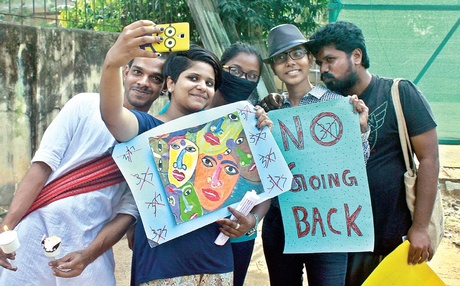Supreme Court agrees to re-examine section 377, refers to 5-judge bench
On Tuesday, the court will hear a “curative petition” which is meant to “cure” any earlier court order perceived as a “miscarriage of justice”. Even with the expanded five-judge bench headed by Justice TS Thakur, a decision to abolish the Court’s 2013 ruling seems unlikely given its previous unwillingness to consider any of the petitioner’s pleas and the generally low rate of success of curative petitions. They had submitted that criminalizing gay sex amounts to violation of fundamental rights of the LGBT community.
However, several political, social and religious groups petitioned the Supreme Court to have the law reinstated, and in 2013 the top court upheld the law, saying it was up to parliament to legislate on Section 377.
The gay rights activists had said thousands from the LGBT community became open about their sexual identity during the past four years after the Delhi High Court “decriminalised” gay sex in 2009, and they were now facing the threat of being prosecuted.
The Supreme Court on Dec 11, 2013 set aside a landmark pro-LGBT judgement of Delhi High Court in 2009, by ruling that homosexuality would continue to remain illegal in the country and would not be constitutionally invalid. “It had also filed a review against the judgment of Supreme Court”.
A batch of eight curative petitions filed by individuals and organisations were heard by the Supreme Court on Tuesday.
Reacting to the court’s move, an activist said, “This is a progressive step in the right direction, it is a corrective measure”.
The curative petition has said that the court had erred in upholding the classification between carnal intercourse in the ordinary course of nature and carnal intercourse against the order of nature under section 377, without recording a finding on the carnal intercourse against the order of nature.
According to Section 377 of the Indian Penal Code (IPC), a 153-year-old colonial-era law, a same-sex relationship is an “unnatural offence”.








